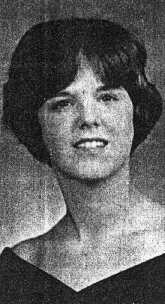Page 118
[Begin Tape 1, Side A]
Brunet: Ginny, do you know when you first decided that you wanted to become a journalist?
Pitt: I really don't. I can't pinpoint it. I can't give you a specific time or date; I don't think anybody can. My guess is that it goes back to when I was a teenager, or even younger than that, maybe. My father was a journalist in the days when journalism was very exciting, in the twenties, in the thirties, in the days of "The Front Page."* He had wonderful stories about being a journalist in New York in those days. My mother was a journalist much later in the forties and fifties. So I grew up in a family of journalists and journalism. My father was a professor of journalism. We always had newspapers all over the house, very many newspapers. I grew up reading newspapers as a child, not just reading the comics, but actually reading the papers, and I guess listening to my father's stories預nd my father was a wonderful storyteller. Drop a pencil, and my dad would tell a story.
I guess listening to those stories and wanting the excitement that I heard in them made me want to go into that field. He sometimes would take me with him on trips when he would go. He was still writing even when he was a professor. He was writing magazine articles. He wrote for Look, and he would write for Reader's Digest. My mother did, too. So I got to meet a lot of people who were in the industry and very high up in the industry. It sort of rubbed off.
Brunet: You had sent me a picture of yourself and four women, that was taken in New York in '65. Was that one of those trips?
Pitt: Yes. My dad was working on an article, and I really don't remember what the article was, but he was working on an article for one of the magazines that he would freelance for, and we went to New York. He had known Kay Lawrence, who was with United Press, before it became UPI [United Press International], and I guess they were contemporaries. My father used to string for United Press and some of the other agencies. So Kay was a friend of Fanny Hurst, and there was a group of women, actually, I guess, who were, again, contemporaries, and we were invited over to Fanny Hurst's apartment to meet Kay and Fanny Hurst and Ishbel Ross, who was an early female reporter in New York, and Ethel Smith was there. I think she's in the picture. She's a musician, a very fine organist. It was '65. What would that make me庸ifteen, sixteen, something like that. So we went over to Fanny Hurst's apartment, and it was very elegant. At least I remember it that way. A big, big wonderful place. She had a little pet monkey, I think it was, and her calla lilies and her grand piano. Ethel Smith played for us on the piano, and Ishbel Ross and Kay Lawrence sat around and talked about women in journalism and laughed, and it was wonderful.
______________________ * Ben Hecht's play about newspapers in the 1920s.

